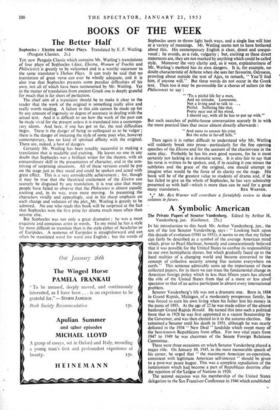BOOKS OF THE WEEK
The Better Half
Sophocles : Electra and Other Plays. Translated by E. F. Watling. (Penguin Classics. 2s.) Sophocles : Electra and Other Plays. Translated by E. F. Watling. (Penguin Classics. 2s.)
THE new Penguin Classic which contains Mr. Watling's translations of four plays of Sophocles (Ajax, Electra, Women of Trachis and Philoctetes) is greatly to be welcomed and is a worthy .successor to the same translator's Theban Plays. It can truly be said that no translation of great verse can ever be wholly adequate, and it is also true that Sophocles presents some peculiar difficulties of his own, not all of which have been surmounted by Mr. Watling. Yet in the matter of translation from ancient Greek one is deeply grateful for much that is far short of perfection.
The chief aim of a translator should be to make it clear to the reader that the work of the original is something really alive and really worth reading. A failure in this aim cannot be made up for by any amount of ingenuity or degree of accuracy in dealing with the actual text. And it is difficult to see how the work of the past can be made vivid for the present unless it is translated into a contempo- rary idiom. And here, if one has got so far, the real difficulties begin. There is the danger of being so colloquial as to be vulgar ; there is the danger of imitating the style of some poet who, however contemporary, has no kind of spiritual affinity with the original. There are, indeed, a host of dangers.
Certainly Mr. Watling has been notably successful in making a translation that is readable and exciting. He leaves no one in any doubt that Sophocles was a brilliant writer for the theatre, with an extraordinary skill in the presentation of character, and in the con- triving of surprising situations. All of these versions could be put on the stage just as they stand and could be spoken and acted with great effect. This is a very considerable achievement ; for, though it may be true that the theatrical excitement of the Electra can scarcely be disguised by any translation, it is true also that many people have failed to observe that the Philoctetes is almost equally exciting and, in its way, even more moving. In presenting the characters vividly and appealingly, and in his sharp emphasis on each change and volution of the plot,_Mr. Watling is greatly to be admired. No one who reads this book will be surprised at the fact that Sophocles won the first prize for drama much more often than anyone else.
But Sophocles was not only a great dramatist ; he was a most exquisite and conscious artist in words. To my mind he has a style far more difficult to translate than is the style either of Aeschylus or of Euripides. A sentence of Euripides is straightforward and can often be translated word for word into English ; but the words of Sophocles seem to throw light both ways, and a single line will hint at a variety of meanings. Mr. Wailing, seems not to have bothered about this. His contemporary English is clear, direct and unequi- vocal; he avoids, as a rule, vulgarity ; but, exciting as these direct statements are, they are not marked by anything which could be called style. Moreover the very clarity and, as it were, explanitoriness of Mr. Watling's method has its own dangers. It is, for example, no doubt characteristic of Athene when she sees her favourite, Odysseus, prowling about outside the tent of Ajax, to remark, "You'll find him, if anyone will." But these words do not occur in the Greek text. Then too it may be permissible for a chorus of sailors (in the Philoctetes) to say :
" 'Tis a pitiful life for a man, And no mistake. Lonesome. Not a living soul to talk to: Pitiful. Pitiful. Suffering like that.
Pretty near out of his mind, -
I should say, with all he has to put up with." But such snatches of public-house conversation scarcely fit in with the more poetical lines that occur almost directly afterwards :
"And none to answer his cries But the echo in far-off hills."
Then again it is rather difficult to understand why Mr. Watling will suddenly break into prose—particularly for the fine opening speeches of the Electra and for the account of the chariot-race in the same play. Probably he has his own good reasons, for he is most certainly not lacking in a dramatic sense. It is also fair to say that his verse is written to be spoken, and, if in reading it one misses the subtleties and the grace of the original, one should attempt to imagine what would be the force of its clarity on the stage. His book will be of the greatest value to students of drama and, if he has failed to give us the whole of Sophocles, he has very admirably presented us with half—which is more than can be said for a great
*** Mr. Rex Warner will contribute a fortnightly review to these columns in future.


































 Previous page
Previous page